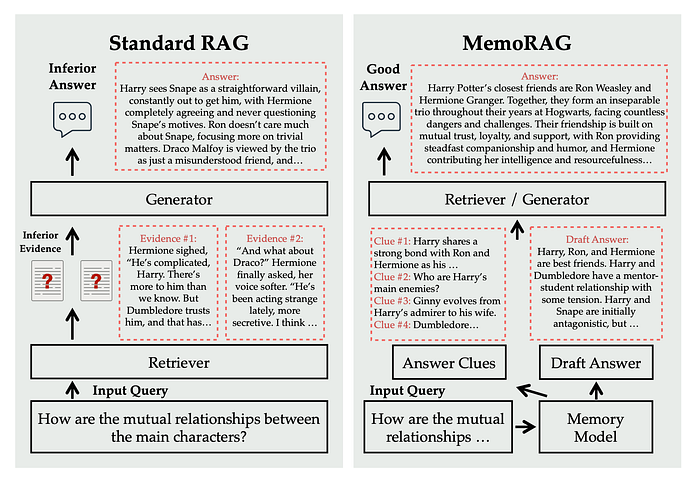
Teaching RAG to “Remember”: How MemoRAG Enhances Question-Answering Through Memory
Last Updated on September 27, 2024 by Editorial Team
Author(s): Florian June
Originally published on Towards AI.
Underlying Principles, Source Code, and Insights
This member-only story is on us. Upgrade to access all of Medium.
Existing RAG systems are limited in handling complex or ambiguous information needs that cannot be directly retrieved from external databases. For instance, traditional RAG systems excel in well-structured question-answering tasks but struggle when the task requires an implicit understanding of the underlying query or involves unstructured data retrieval.
A new study, “MemoRAG,” aims to address this issue by utilizing a long-term memory system that recalls relevant information based on context, significantly enhancing retrieval efficiency for complex tasks.
This article begins with an overview of MemoRAG, followed by an explanation of its principles through code analysis. Next, it details the training process and presents an evaluation along with a case study. Finally, I will share my thoughts and insights on this approach, including a comparison with GraphRAG.
As illustrated in Figure 1, Standard RAG, shown on the left, struggles to accurately locate the necessary evidence due to the implicit nature of the input query, resulting in a less precise answer. In contrast, MemoRAG, shown on the right, constructs a global memory across the entire database. When presented with the query, MemoRAG first recalls relevant clues, enabling the retrieval of useful information and leading… Read the full blog for free on Medium.
Join thousands of data leaders on the AI newsletter. Join over 80,000 subscribers and keep up to date with the latest developments in AI. From research to projects and ideas. If you are building an AI startup, an AI-related product, or a service, we invite you to consider becoming a sponsor.
Published via Towards AI
Take our 90+ lesson From Beginner to Advanced LLM Developer Certification: From choosing a project to deploying a working product this is the most comprehensive and practical LLM course out there!
Towards AI has published Building LLMs for Production—our 470+ page guide to mastering LLMs with practical projects and expert insights!

Discover Your Dream AI Career at Towards AI Jobs
Towards AI has built a jobs board tailored specifically to Machine Learning and Data Science Jobs and Skills. Our software searches for live AI jobs each hour, labels and categorises them and makes them easily searchable. Explore over 40,000 live jobs today with Towards AI Jobs!
Note: Content contains the views of the contributing authors and not Towards AI.














